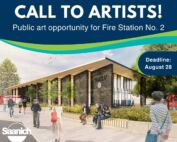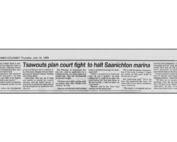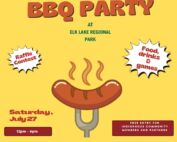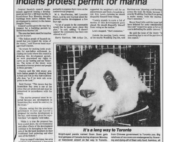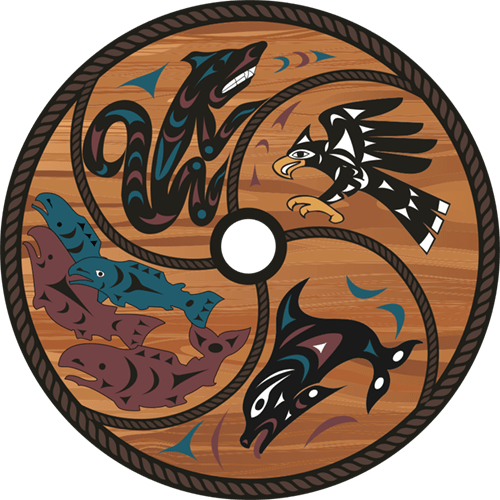The W̱SÁNEĆ Leadership Council has been over 20 years in the making. Today, with 8 staff and several prominent wins under its belt, we reflect on the story of how the WLC came to be.
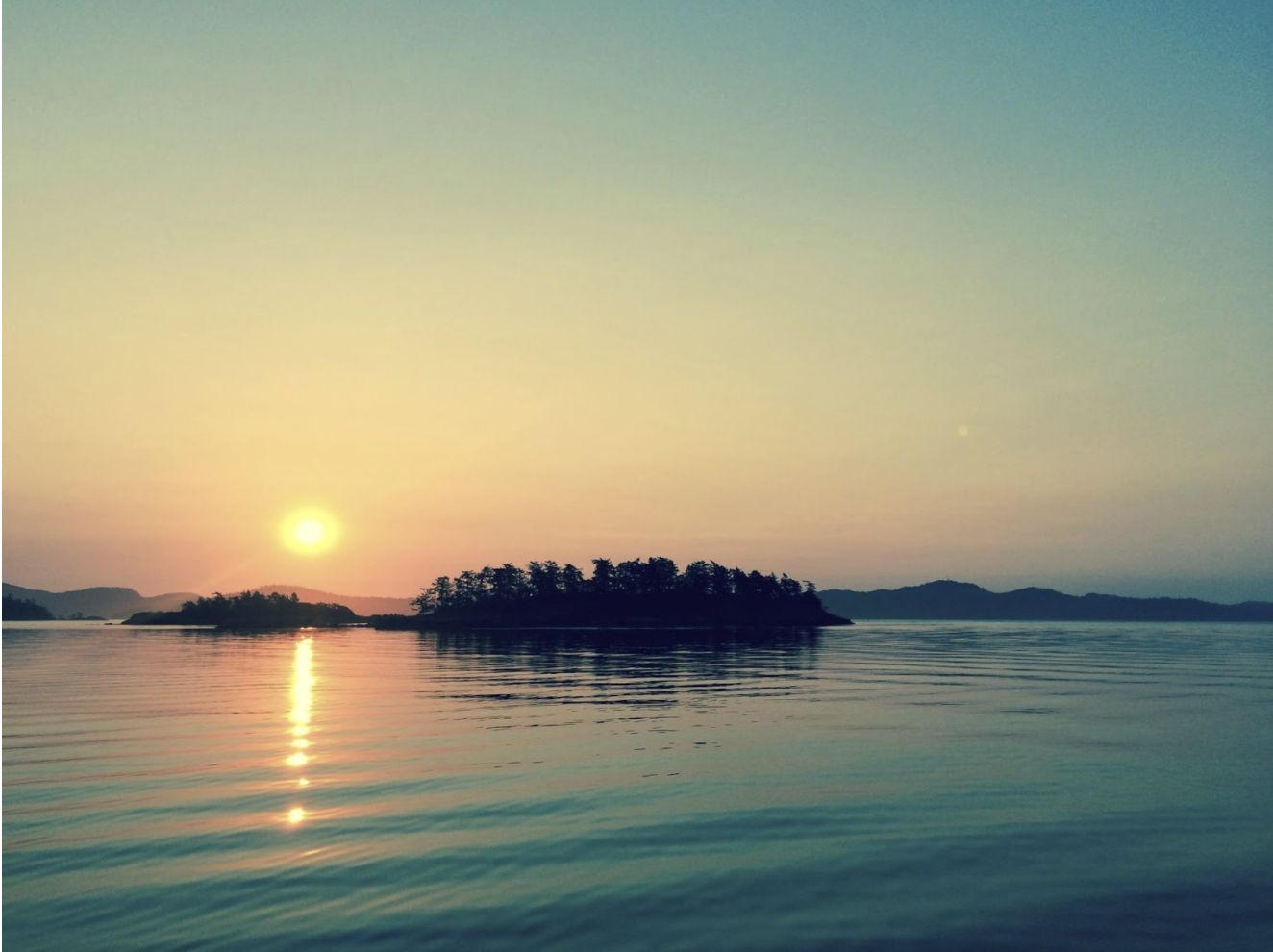
Shown above, the Gulf Islands. The roots of the WLC began with the formation of the Gulf Islands National Park Reserve
In 2003, the Gulf Islands National Park Reserve (GINPR) was founded and subsequently, another colonial body began operations in W̱SÁNEĆ territory. A consultation committee (also known as the GINPR Parks Committee) was developed under Parks, which consisted of one Chief and one nominated counsellor from Tsartlip, Pauquachan, Tsawout and Tseycum. This committee was funded through a contribution agreement under GINPR.
The GINPR wanted to ensure the consultation requirement was met, however, the Chiefs and counsellors wanted to have a say in the GINPR activities taking place within W̱SÁNEĆ territory. After a while, it became clear that this W̱SÁNEĆ Parks Committee was experiencing three main obstacles that were preventing them from having the desired impact.
The first barrier to success was that the organization was a consultation group. Instead of true community engagement or collaboration on projects that impacted W̱SÁNEĆ community members, external bodies would simply give notice of activities taking place within W̱SÁNEĆ Territory; a standard procedure for consultation groups. These notices are known as referrals, a method the government uses to inform First Nations of projects that often gives Nations less than 30 days to respond.
The second obstacle to meaningful impact was the sheer number of external organizations submitting these referrals. In fact, in just one month, Tsartlip alone was corresponding with over 42 different organizations that wanted to conduct activities within W̱SÁNEĆ territory. Some of these organizations had huge budgets and hundreds or thousands of employees such as the Airport, BC Ferries and the CRD.
Joni Olsen, Policy/Negotiations Analyst at the WLC shares, “Each individual band is too small to deal with all this and there are huge complexities with other governing bodies making decisions on our land.”
The third obstacle to successfully getting control back over activities in the territory was the lack of mechanism or process between bands to deal with issues that affected overlapping and shared territories.
As such, the initial Parks committee consisting of Chiefs and Councillors sought out a different approach to better serve their membership and increase their ability to enforce decision making on their land, as well as best manage issues that affected shared/overlapping territories.
UBCIC, in an article entitled Recognition of Rights Policy for Treaty Negotiations in BC is Fundamentally Flawed shares “Indigenous Nations involved in overlapping or shared territorial disputes will undoubtedly have their Title and Rights infringed upon because of the Policy.”
In the shared territories conference this issue was discussed at length and the recommendation was to form an organization similar to the WLC. One that has shared governance between affected Nations and operates alongside the Bands, without draining the resources from their Administration or affecting their other governance structures in any way.
In fact, the Stó:lō people have implemented a similar structure for dealing with referrals by creating Stó:lō Connect. where the Aitchelitz, Chawathil, Cheam, Kwaw’Kwaw’Apilt, Leq’á:mél, Semá:th, Shxwhà:y Village, Shxw’ōwhámel, Skowkale, Skwah, Soowahlie, Sq’ewá:lxw, Sq’éwlets, Squiala, Stó:lō Nation, Stó:lō Tribal Council, Stó:lō Xwexwilmexw Treaty Association, Ts’elxwéyeqw, Tzeachten, Yakweakwioose, and Yale all work together.
From 2003 to 2017, discussions with the Gulf Island National Park Reserve about expanding to a more comprehensive arrangement that could include co-managing parks weren’t yielding results. In addition to these talks, the National Marine Conservation Area Reserve feasibility discussions were happening with the Parks Committee.
These two files; the Indigenous Right to Self-Determination ( RIRSD), and the management of the Park reserve were brought up by the W̱SÁNEĆ Parks Committee with Joe Wild, the Assistant Deputy Minister. The conversations were about exploring a more comprehensive agreement for GINPR under the RIRSD. In order to do so, a formalized governing body was needed in order to negotiate an agreement with Canada under the RIRSD.
These exploratory discussions led to negotiations and, at last, an agreement was completed with Canada to discuss the big issues that affect all of W̱SÁNEĆ . The W̱SÁNEĆ Leadership Council was formalized for the purpose of having these discussions in a meaningful way; a manner in which W̱SÁNEĆ people would have increased decision making powers in their own territory. The legal advisors for the committee at the time recommended the formation of the W̱SÁNEĆ Leadership Council as a not-for-profit society under BC Societies Act.
On May 8th 2018, the WLC was officially formed. In addition to the first two files under the RIRSD were The Gulf Islands National Park Reserve and the NMCAR feasibility. A letter of understanding (MOU) was created stating that Parks, Education, Douglas Treaties and Land Acquisition were all areas the WLC would seek to advance W̱SÁNEĆ interests. In short, the WLC would begin negotiating with external bodies on larger-scale issues that affect individual bands but where bands struggled with the resources to adequately manage these discussions.
While the structure of the WLC is given power by each Chief and Council, the WLC seeks to incorporate W̱SÁNEĆ culture into how it makes decisions. Upon the formalization of the WLC – an Elders advisory committee was established consisting of John Elliott, Simon Smith Sr. and the Late Lou Claxton – one elder from each participating Nation. In addition, the WLC relies heavily on the input and guidance from the W̱SÁNEĆ Technical Advisory Committee (WTAC), Knowledge Holders, Language Speakers, members of the Environmental Committee, Cultural Monitors as well as the upcoming Youth Committee to make decisions.
The WLC, has grown in capacity and capability since 2018, and as of now has 8 staff focused on increasing the respect for and articulation of W̱SÁNEĆ rights. As a result, the status and power of the W̱SÁNEĆ people have been elevated in terms of making decisions within W̱SÁNEĆ territory. Now, instead of simply informing the organization of activities taking place within the territory, external parties must obtain consent.
Stay up to date on this story and more – sign up for our newsletter.


